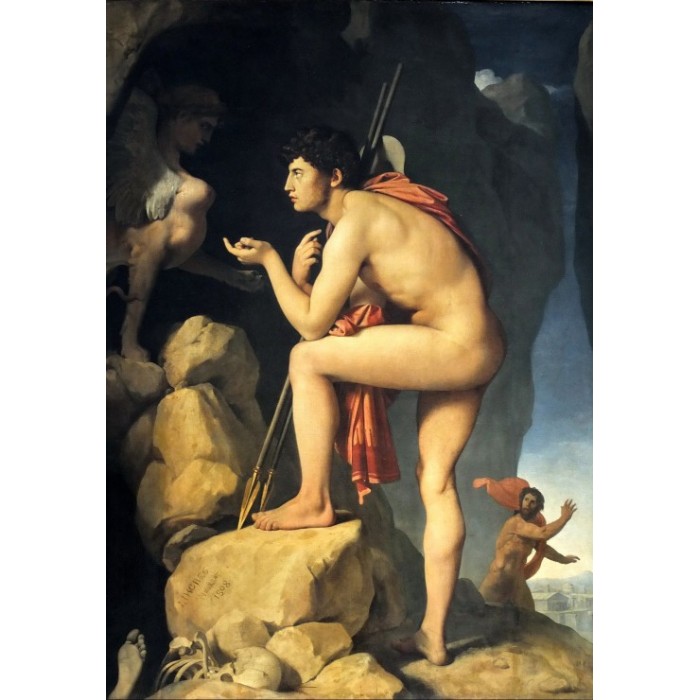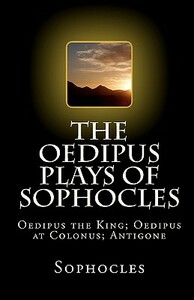Take a photo of a barcode or cover
541 reviews for:
The Oedipus Plays of Sophocles: Oedipus the King; Oedipus at Colonus; Antigone
Sophocles
541 reviews for:
The Oedipus Plays of Sophocles: Oedipus the King; Oedipus at Colonus; Antigone
Sophocles
ok yayyy finally i finished reading this. love to that intro to poli sci professor five years ago who made us buy the whole book just to read antigone, i prefer this translation to what i'd read b4. interesting to be reading this alongside learning about freud's oedipal complex, freud seems to have done a very modern thing in attaching a name to something that doesn't quite share its meaning. antigone will be one of my favourites forever, but oedipus at colonus sneakily got me with how much it's like king lear
Another one of the books that got me into literature. The number of references to this one throughout not only literature, but also many other disciplines (including leadership, sociology, etc.) is impressive.
challenging
fast-paced
Plot or Character Driven:
A mix
Strong character development:
No
Loveable characters:
No
Diverse cast of characters:
No
Flaws of characters a main focus:
Yes
challenging
dark
emotional
sad
tense
medium-paced
Plot or Character Driven:
A mix
Strong character development:
Yes
Loveable characters:
Complicated
Diverse cast of characters:
N/A
Flaws of characters a main focus:
Yes
Graphic: Incest, Suicide, Violence
not rating this cause it was for school and idk how to feel - prob biased cause it was for school lol
Such a fascinating exploration of so many themes--fate, providence, prophecy, honor, family -- none of which have anything whatsoever to do with Freud's "oedipal complex." What a bizarre thing to pull from these plays.
on to Euripides...
on to Euripides...
7th book of 2022.
As I'm moving around the (personally) uncharted land of Greek tragedies, I get to Sophocles. I think most people know the story of Oedipus, or can at least guess with general Freud knowledge, but the subsequent two plays in the 'Cycle' were unknown to me plot-wise. Oedipus the King/Oedipus Rex/Oedipus Tyrannus is the first and famous story from Sophocles, where a man attempts to flee the prophecy that he will kill his father and marry his mother. Spoiler alert: he does not outrun it. The following play presents us with a now blinded Oedipus (he blinds himself in the first) with his daughter Antigone (what a call name), in an open landscape, waiting. It's quite clear that Waiting for Godot is a product of this play. It's the weakest of the three despite the Beckett vibes. Theseus shows up and is benevolent to the blind ex-king, but also some great action-hero dialogue [1]. The final play, moving through them without too many spoilers, shows us the lives of Oedipus' children after his death. As expected from a Greek Tragedy, a lot of people die. They are enjoyable reads and as far as my translation went, smooth ones too. What's interesting is seeing what vices were being portrayed in art this long ago that still ravish us today, and usually one can find quite a few. Here we question how much of our lives are predetermined, or even out of our control, by what comes before us, by the choices our parents make, before we have even been conceived. We do not choose where we are born, who we are born to. Our entire lives have to be carved from the position we find ourselves in.

__________________________________
[1] I make no boasts, but while my life is safe,
You need not fear for yours.
As I'm moving around the (personally) uncharted land of Greek tragedies, I get to Sophocles. I think most people know the story of Oedipus, or can at least guess with general Freud knowledge, but the subsequent two plays in the 'Cycle' were unknown to me plot-wise. Oedipus the King/Oedipus Rex/Oedipus Tyrannus is the first and famous story from Sophocles, where a man attempts to flee the prophecy that he will kill his father and marry his mother. Spoiler alert: he does not outrun it. The following play presents us with a now blinded Oedipus (he blinds himself in the first) with his daughter Antigone (what a call name), in an open landscape, waiting. It's quite clear that Waiting for Godot is a product of this play. It's the weakest of the three despite the Beckett vibes. Theseus shows up and is benevolent to the blind ex-king, but also some great action-hero dialogue [1]. The final play, moving through them without too many spoilers, shows us the lives of Oedipus' children after his death. As expected from a Greek Tragedy, a lot of people die. They are enjoyable reads and as far as my translation went, smooth ones too. What's interesting is seeing what vices were being portrayed in art this long ago that still ravish us today, and usually one can find quite a few. Here we question how much of our lives are predetermined, or even out of our control, by what comes before us, by the choices our parents make, before we have even been conceived. We do not choose where we are born, who we are born to. Our entire lives have to be carved from the position we find ourselves in.

Our fires, our sacrifices, and our prayers
The gods abominate. How should the birds
Give any other than ill-omened voices,
Gorged with the dregs of blood that man has shed?
Mark this, my son : all men fall into sin.
But sinning, he is not for ever lost
Hapless and helpless, who can make amends
And has not set his face against repentance.
Only a fool is governed by self-will.
—Teiresias
__________________________________
[1] I make no boasts, but while my life is safe,
You need not fear for yours.
medium-paced
Hackett is my go-to publisher for Greek plays. Meineck and Woodruff are often involved. I started using another edition for "Antigone", and found myself coming back to this edition.
Great use of modern language, yet keeping the flow of the Greek text (no, I do not read ancient Greek).
Great Intro, Notes and Bibliography (one for Students, one for Scholars!).
Yes, "Colonus" does go on and on. But really, "Antigone" even more so - thought it would never end! OTOH, I would like to send a copy of "A" to every Republican politician - with the reminder that Creon is not the Good Guy!
And yes, "Oedipus Tyrannus" should be read now and then, just as a reminder what Freud is writing about.
Also nice that they provide a thumbnail of Hegel on "Antigone".
I have not read the Greek tragedies in decades, but I do need a break now after reading these 3 in a row. I did read them in order of events, rather than in order of when Sophocles wrote them ("Antigone" ends the cycle, but was the first written and performed).
Yes, I am doing a Theban play reading - a few more, and a few more various editons/translations to go.
Great use of modern language, yet keeping the flow of the Greek text (no, I do not read ancient Greek).
Great Intro, Notes and Bibliography (one for Students, one for Scholars!).
Yes, "Colonus" does go on and on. But really, "Antigone" even more so - thought it would never end! OTOH, I would like to send a copy of "A" to every Republican politician - with the reminder that Creon is not the Good Guy!
And yes, "Oedipus Tyrannus" should be read now and then, just as a reminder what Freud is writing about.
Also nice that they provide a thumbnail of Hegel on "Antigone".
I have not read the Greek tragedies in decades, but I do need a break now after reading these 3 in a row. I did read them in order of events, rather than in order of when Sophocles wrote them ("Antigone" ends the cycle, but was the first written and performed).
Yes, I am doing a Theban play reading - a few more, and a few more various editons/translations to go.





